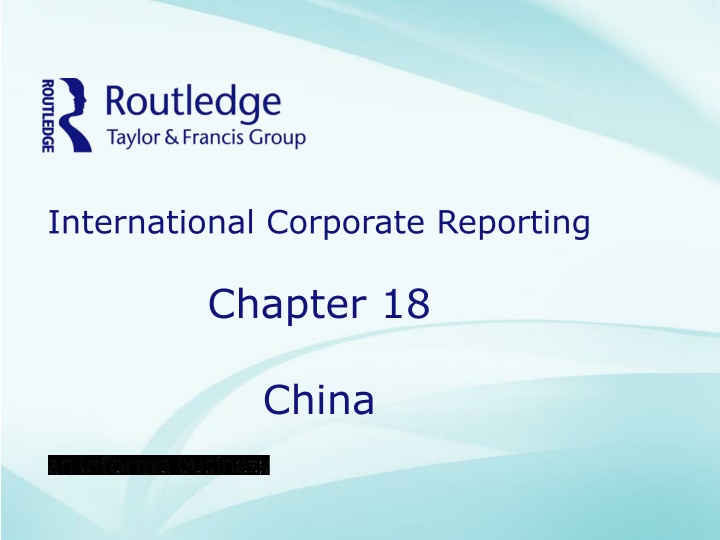
Evolution of Accounting Standards in China
Explore the historical development of accounting in China from communist practices to a market-based approach, culminating in alignment with international standards like IFRS. Learn about the political, economic, legal, and taxation systems influencing this evolution.
Download Presentation

Please find below an Image/Link to download the presentation.
The content on the website is provided AS IS for your information and personal use only. It may not be sold, licensed, or shared on other websites without obtaining consent from the author. If you encounter any issues during the download, it is possible that the publisher has removed the file from their server.
You are allowed to download the files provided on this website for personal or commercial use, subject to the condition that they are used lawfully. All files are the property of their respective owners.
The content on the website is provided AS IS for your information and personal use only. It may not be sold, licensed, or shared on other websites without obtaining consent from the author.
E N D
Presentation Transcript
International Corporate Reporting Chapter 18 China
Early history 1949 People s Republic of China (PRC) Adopted communist accounting (from Russia) 1958-9 Great Leap Forward 1966-76 Cultural Revolution No development of accounting
Move to a market-based approach 1980s some liberalisation but selective. 1992 Deng Xiao Ping allowed market-based approach. 1992 Enterprise Accounting System (EAS), idea of reporting to external users. Accounting principles, measurement rules, qualitative characteristics
Accounting developments 1997 onwards Gradual new accounting developments. 2001 New Accounting System for Business Enterprises (closer to Western accounting). 2006 Issued Accounting Standards for Business Enterprises
Uniform Accounting System Uniform Accounting System/ Accounting System for Business Enterprises Brings Chinese accounting closer to international practice Ideas resemble IASB Framework Standards closer to IFRS/IASs (all needed for WTO membership)
Accounting System for Business Enterprises February 2006, MoF released new ASBE with 38 standards. Applied by listed companies from 1 January 2007. Brought practice largely into line with IFRS. Some reluctance because of perceived potential for manipulating profit
Political and economic system One-party political system. Move to market socialism, but with control. 2001 China joined World Trade Organization. 2001-2006 Accounting standards written for China, based on IFRS
Legal system National People s Congress State Council Ministries and Commissions Accounting regulation moving from industry- based regulation towards uniform rules for all enterprises.
Taxation system Before economic reform, all surpluses transferred to state. Business taxes now applied. Strong incentives to encourage foreign investment, but detailed conditions to discourage abuse.
Stock market Stock exchanges developing, Shanghai, Shenzhen. Hong Kong China has separate exchange. Different types of shares in different markets, A, B, H shares. Chinese Securities Regulatory Commission
Accounting profession CICPA (formed 1988) Under government influence. Advises but does not set standards. Issues guidance on standards. Moving towards greater independence of audit firms from government influence.
Non-financial reporting Rapid increase in the number of Chinese companies making corporate social responsibility (CSR) disclosures in their public reporting. National Plan on the implementation of a 2030 Agenda for Sustainable Development. By 2020, CSRC will mandate all listed companies and bond issuers to disclose environmental, social and governance (ESG) risks associated with their operations.
Embedding sustainability Climate Disclosure Board case study on China https://www.cdsb.net/sites/default/files/cdsb_case_study_china.pdf Our research revealed that the national focus on environmental issues, especially climate change, has resulted in the majority of reporting and disclosure requirements being focused on environmental issues. This means that there are still limited mandatory reporting requirements for the other aspects of ESG reporting, which may improve as the SDGs are further implemented into the national strategy. (page 7)
Auditing CICPA sets professional standards and rules on auditing and ethics. Ministry of Finance approves rules for release. 2006 new Auditing Standards for CPAs, mainly aligned with ISAs. 2012 new auditing standards based on IAASB clarity project. 2010 Code of ethics converged with IESBA standards.
2018 Corporate Governance Code Companies required to establish Party organisations (political role). establishing ESG requirements, such as green development and targeted poverty alleviation. encouraging cash dividend distribution. promoting board diversity. strengthening audit committee function. restricting the powers of controlling shareholders.
Hong Kong China One country two systems Market-led capitalist system. Strong capital market. British influence historically. HKSA sets own exams, historical link to ACCA (UK). HKSA sets accounting standards, HKIFRS, converging with IFRS/IASs.
Research examples Fair value accounting Creating social networks, within and beyond China, was a significant feature of the successful reintroduction of FVA. Earnings management When the tax rate changed, only those affected firms with politically connected management engaged in earnings management. Language and context Compared to ASBE, translation of the IFRS Standards was helpful to improving the learning efficiency of accounting standards. Auditing Auditors help to reduce earnings management before a stock- financed acquisition.
